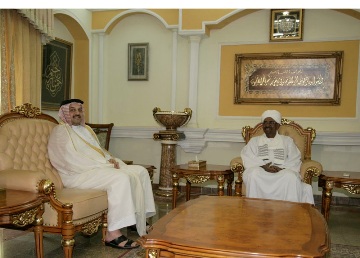Qatar’s foreign minister pays lightning visit to Khartoum: state media
October 5, 2013 (KHARTOUM) – The Sudanese president Omer Hassan Al-Bashir received the Qatari foreign minister Khalid Al-Attiyah on Saturday during his two hours stop in Khartoum, official news agency (SUNA) reported.

Al-Attiyah has expressed appreciation to the deeply-rooted relations between Sudan and Qatar, SUNA added.
No other details were provided on what specific subjects were discussed.
The London-based Asharq Al-Awsat newspaper said that reporters even from SUNA and Sudan TV were barred from covering the meeting and quoted analysts who speculated that the Qatari official came with either a message of support or warning to Khartoum in wake of recent events.
The Sudanese government has recently rolled out an economic package that triggered some of the worst protests Sudan has seen in years with death toll surpassing 200 according to Amnesty International.
Officials insisted that the reforms which involved scaling back fuel subsidies are needed to prevent an economic collapse and divert the money to other sectors such as agriculture.
This week informed sources told the pro-government Al-Rayaam daily that the central bank will receive a $1 billion deposit from Qatar within the coming few days, saying that it will help stabilize exchange rates and curb the rise of dollar price in the black market and mobilize productive sectors.
Qatar has not commented on the outbreak of protests in Sudan but its neighbor the United Arab Emirates (UAE) issued a statement saying it is “deeply concerned” about the “violent and unjustified” dealings with these events and the impact it has on the Sudanese society.
The UAE also called on the Sudanese government “to demonstrate the maximum wisdom and caution in dealing with these demonstrations and popular demands that are marked by livelihood [economic] nature and emphasizes the need to secure the lives of civilians so as to maintain the stability of Sudanese state and society”.
This week the Sudanese foreign ministry issued a statement seeking to distance itself from assertions by pro-government columnists which accused Saudi Arabia of standing behind the demonstrations with the goal of toppling the regime.
Qatar has been one of the few countries where Sudan enjoys relatively warm relations with. For years the rich Arab Gulf state has hosted peace talks between the Sudanese government and Darfur rebel groups which eventually resulted in signing of a peace accord in 2011.
Furthermore, Qatar also pledged $2 billion last year in the form of investments and purchases of government bonds to help its beleaguered economy reeling from the impact of losing the oil-rich south last year.
But economic expert Khalid Elnour told Sudan Tribune earlier this year that out of the $2 billion promised by Doha only $500 million was actually disbursed.
Qatar has undergone a power shift with last July’s accession of a young emir, Sheikh Tamim bin Hamad al-Thani, after the abdication of his father.
Analysts have disagreed on whether this will lead to a shift in Qatar’s policy regarding Sudan.
(ST)
